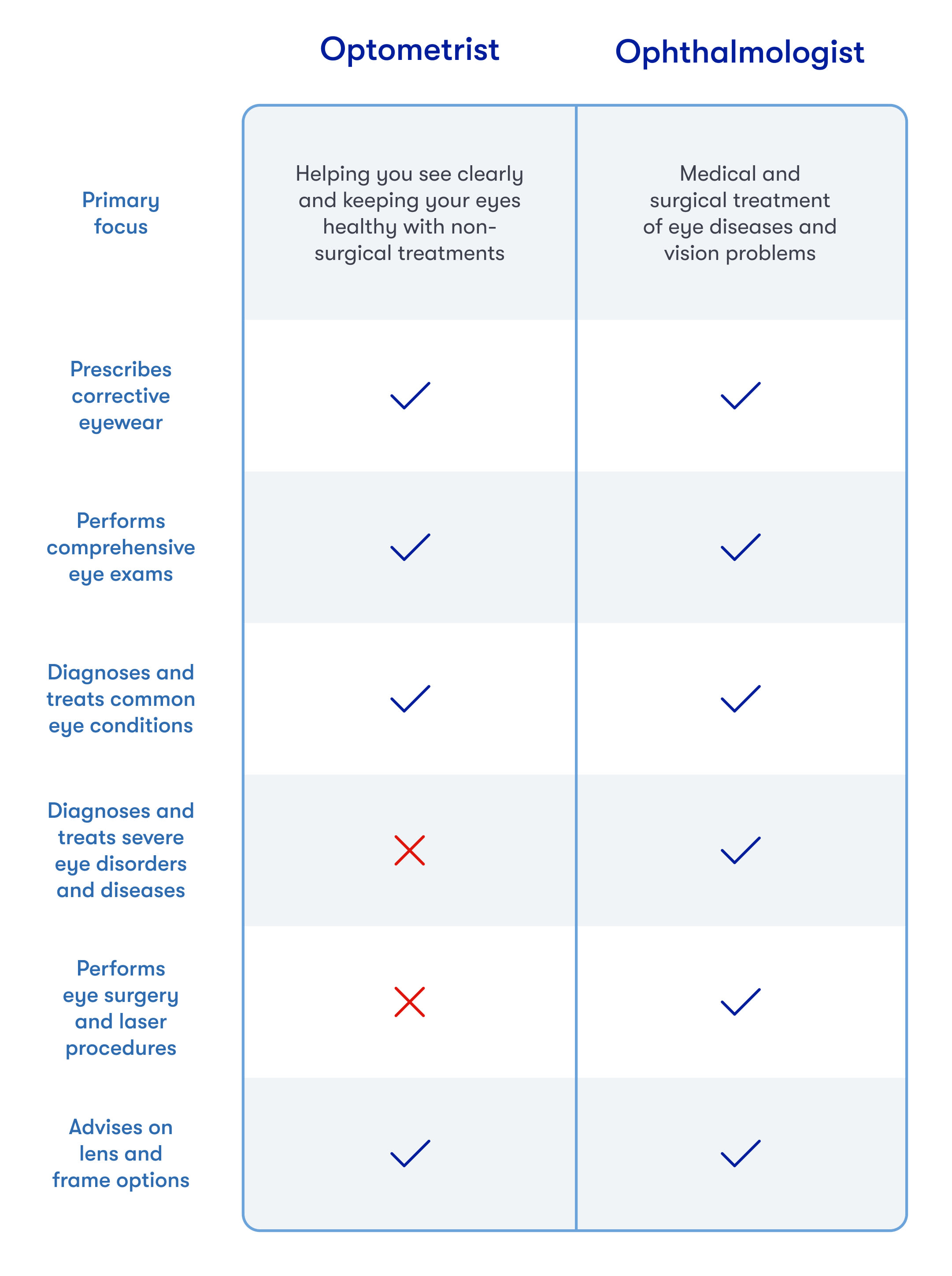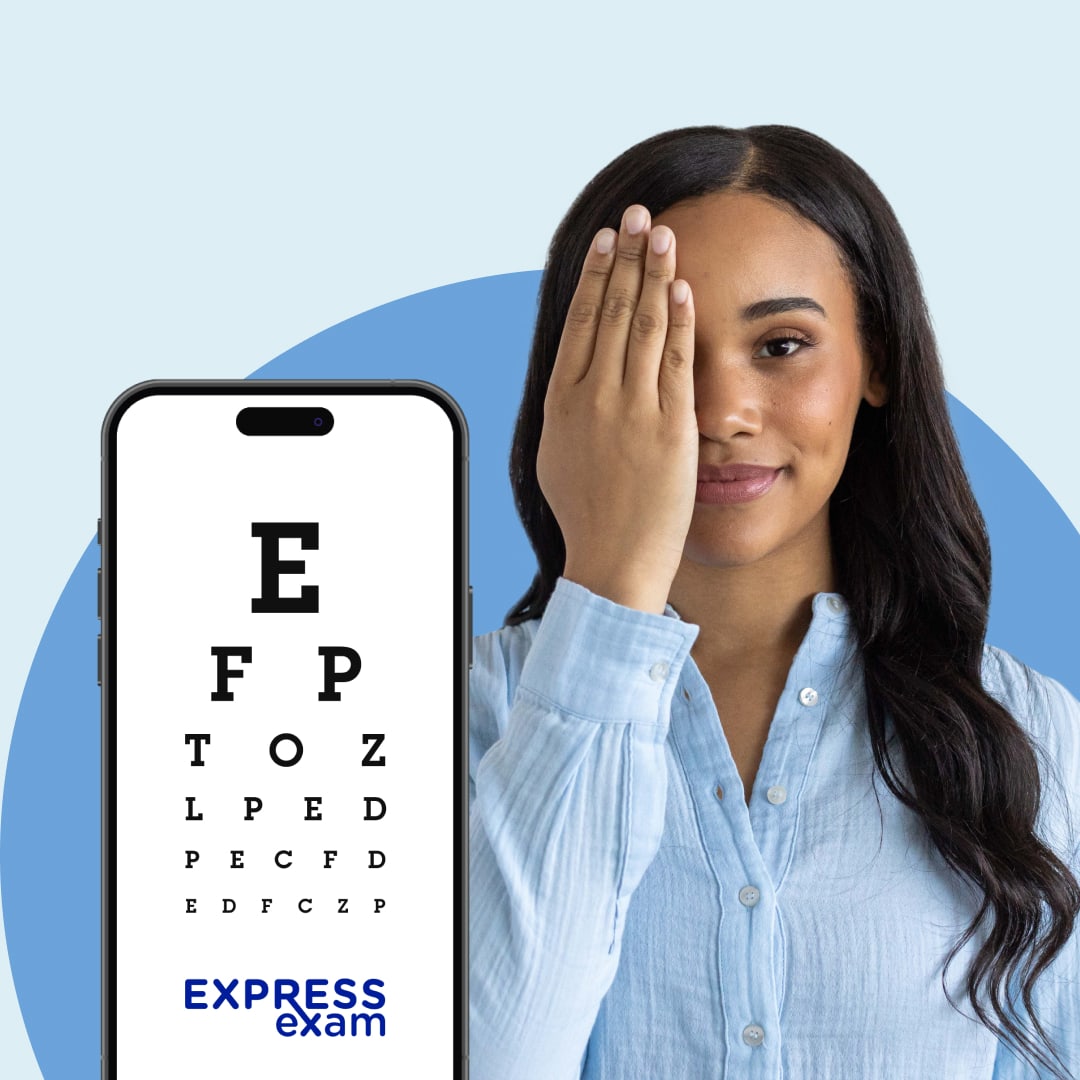Ophthalmologist vs optometrist
You've noticed the fonts on your computer look serif even when they're not or you get headaches at the end of the day. Vision changes, headaches or other issues with your eyes are often signs it's time to visit an eye care professional. But when you start searching for a provider in your area, you discover two big "O" words.
When it comes to ophthalmologist vs. optometrist, which one is right for you?
Both of these professionals are qualified eye care providers, but their job in caring for your vision is quite different. An optometrist provides routine eye exams, diagnoses common vision problems, and prescribes glasses or contacts. An ophthalmologist is a medical doctor who can do everything an optometrist can but also treat eye diseases and, in some cases, perform procedures on the eye.
Most people starting their vision care journey probably only need an optometrist, but we'll dig deeper into the differences below so you can make an informed decision.

What is an optometrist?
An optometrist is your go-to eye care provider for all things vision correction. Think of them as the primary care provider for your eyes. Look for professionals with the credential of OD.
What they focus on
Helping you see clearly and keeping your eyes healthy with non-surgical treatments
What they do
-
Perform routine eye exams
-
Diagnose common eye conditions like nearsightedness, farsightedness, and astigmatism
-
Prescribe glasses and contact lenses
-
Screen for eye diseases such as glaucoma or macular degeneration
-
Provide pre- and post-operative care if you get eye surgery elsewhere
Education and training
-
Bachelor’s degree (typically in a science or related field)
-
Doctor of Optometry (OD), which is a 4-year degree
-
Optional residency in a specialty area like pediatrics or ocular disease
When to visit an optometrist
Say you're squinting at your laptop and can’t tell if your screen needs cleaning or your eyes can't even. Or maybe you need to renew your contact lens prescription or want help finding rebates. That’s optometrist territory.

Online Vision Exam at 1-800 Contacts
Renew your prescription online with ExpressExam
Try ExpressExam
What is an ophthalmologist?
An ophthalmologist is a medical doctor for your eyes. Think of them more as a specialist or a primary care provider with specialist capabilities. Look for credentials like MD and DO.
What they focus on
Medical and surgical treatment of eye diseases and vision problems
What they do
-
Diagnose and treat complex eye diseases (like cataracts, glaucoma, and retinal disorders)
-
Perform surgeries such as LASIK, cataract removal, or retina repair
-
Prescribe medications for eye conditions
-
Provide comprehensive eye exams, including prescriptions for glasses and contacts
-
Handle emergencies, like sudden vision loss or eye injuries
Education and training
-
Bachelor’s degree
-
Medical school (MD or DO)
-
1-year internship
-
3-year ophthalmology residency
-
Optional 1–2 year fellowship for surgical specialties
When to visit an ophthalmologist
If you're thinking about LASIK, need surgery for cataracts, or have a medical condition affecting your eyes, it’s time to call the big guns — aka, the ophthalmologist.
Why would a patient see an ophthalmologist?
While optometrists handle the majority of routine vision needs, ophthalmologists step in when things get more complex. These medical doctors specialize in diagnosing and treating eye diseases that go beyond simple prescriptions, including cataract removal or managing chronic conditions like glaucoma or diabetic retinopathy.
If you have a specialized eye condition or symptoms that suggest something more serious than dry eyes or blurry vision is going on, an ophthalmologist is usually the next stop. You might see one after being referred by your optometrist, or you may skip straight to them if you’re already dealing with an existing diagnosis or urgent concern.
Signs it might be time to call an ophthalmologist include:
-
Sudden or severe vision loss
-
Eye pain that doesn’t go away
-
Seeing flashes of light or a sudden increase in floaters
-
Injuries to the eye
-
Persistent redness, swelling, or discharge
-
A family history of eye disease
-
Conditions like cataracts, glaucoma, or macular degeneration
-
Needing eye surgery (like LASIK or cataract surgery)
What can an ophthalmologist see that an optometrist cannot?
Ophthalmologists and optometrists can diagnose common vision problems, prescribe corrective lenses, and treat everyday eye conditions like infections or dryness. Ophthalmologists are qualified to diagnose more complex eye diseases and perform eye surgery.
Ophthalmologists are qualified to:
-
Perform eye surgeries like LASIK, cataract removal and corneal transplants
-
Diagnose and treat advanced conditions like glaucoma, macular degeneration, and retinal detachment
-
Manage chronic eye diseases tied to other health conditions, like diabetes or high blood pressure
-
Administer specialized injections for retinal diseases or inflammation
-
Evaluate and treat complex or uncommon vision loss
Who is more qualified, an optometrist or an ophthalmologist?
The difference between optometrists and ophthalmologists is about more than qualifications. Sure, an ophthalmologist is "more educated" in that they're required to go through medical school and residencies. This also results in more specialized training.
However, that doesn't make an ophthalmologist the best or most qualified choice for every vision care need. If you want an updated contacts prescription or to find out whether you need reading glasses, an optometrist who deals with such questions daily is likely more "qualified" for that need.
When it comes to professional licenses, optometrists and ophthalmologists both need licenses to practice and are obligated to uphold the ethical, practical, and clinical requirements for those licenses.
In short, as long as you choose the person with the title that's right for your eye care needs, you're in qualified hands.

Order Contact Lenses Online
Learn how to order contact lenses online at 1-800 Contacts
Order contacts
Should seniors see an ophthalmologist or optometrist?
Older adults who have worn glasses or contacts since middle age or before can continue seeing their normal optometrist for basic vision care needs. After all, it's not your first rodeo — or theirs.
However, because ophthalmologists do focus on a wider range of conditions — and age can put you at more risk for several of them, it can be a good idea to get an appointment with this type of eye care provider too. As you head into your Golden Years, an occasional peek into your peepers by both kinds of eye care providers can help identify issues before they become bigger problems.
Is it better to see an ophthalmologist or optometrist?
One of these professionals isn't automatically better than the other. It depends on what you need from your eye care visit. New prescription, questions about mild headaches you think are linked to your vision, or a switch from glasses to contacts? Those have optometrist written all over them. Complex eye concern, sudden eye emergency, or a desire or need for eye surgery? You're gonna need an ophthalmologist.
Ready to fill your contacts prescription
Whether an optometrist or an ophthalmologist wrote it, we can help you fill it. Find out how to order contacts for more convenient vision correction.
Did you know you can order contacts online?
Say goodbye to trips to the eye doctor and hello to convenience! With 1-800 Contacts, you can easily order your contact lenses online and have them delivered straight to your door. Plus, our online vision exam makes it simple to get the prescription you need without leaving home. And the best part? You’ll save money on your first order with 1-800 Contacts. It’s never been easier to get your contacts!
Original author: Austin Brewer
Original publish date: 4/27/2022
Updated date: 8/20/2025





